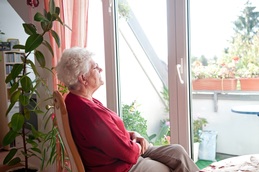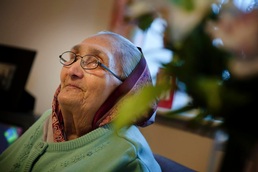Religion can provide a 'common bond' for care home residents to instantly feel at home
Keeping in touch with one’s religion and culture is a crucial part of care community life, according to Simon Pedzisi, deputy director of care at Nightingale Hammerson, which runs two care homes in south west and north west London for older Jewish people.
Made up of two homes providing care for 300 residents, this not-for-profit organisation’s services are organised to support each client’s desire to pursue worship and spirituality in the manner they are accustomed.

Mr Pedzisi explains: “For many residents, being Jewish and celebrating Jewish festivals with family, friends and food, has been a constant anchor in their lives. This common ground allows residents to instantly bond with each other, and it is this emphasis that makes Nightingale Hammerson different to a lot of other care homes.”
Chief executive Leon Smith comments further on the ways in which this bond is achieved, saying: “There is a real sense of community at our care homes, which is in part down to how we celebrate our culture with reminiscence activities, traditional Jewish food and religious festivals. This familiarity is vital in ensuring our residents feel as at home here as they did before moving into a care home.”
The Dignity in Care network specifies that: ‘Individuals’ religious preferences are part of their individual identity and must always be observed. These should be ascertained at the point where an individual is considering moving into the home and the home must make it clear whether or not those preferences can be observed.’
For our March Newsletter, two care providers share with carehome.co.uk their own experiences in respecting the religious sentiment of their residents and offer a valuable insight into how spirituality can be incorporated into a quality care portfolio.
Nightingale House
Nightingale House and merged in 2012 to become Nightingale Hammerson. Nightingale House has operated for more than 170 years and Hammerson House was established 50 years ago. During the 1840s, the Jewish population of London increased four-fold and the capital’s The Jews’ Hospital required additional provision to enable more care for older citizens.
The partnership between the two homes grew from the opportunity to work closely in areas such as fundraising, training, occupational therapy and physiotherapy, while also furthering elements of the religious bond the homes already had.
Dedicated to providing ‘a home for life’ for its residents regardless of how much their physical or intellectual health may deteriorate, religion remains one of the leading priorities around which Nightingale Hammerson’s activities, events and entertainments are organised. These include celebrations of Jewish festivals and a range of cultural activities celebrated through reminiscence groups, music and poetry readings. Synagogue services are held on Shabbat and over festivals, while good diet is provided partly through authentic Jewish cuisine.
Assistant director Sally Miller explains: “Volunteering and a sense of looking after the community are very important in Jewish culture and this is evident by the number of volunteers we have – around 240 across both homes. They organise discussion groups, games, outings, morning teas, baking and pampering days for residents.”
Although despite the strong focus upon faith, Ms Miller points out that, “Aside from these differences, the day-to-day running of Nightingale House and Hammerson House is similar to most other good quality care homes.”
For some complex needs, however, care home life needs to function in a way that prioritises the mental health of the patient – most notably amongst residents with dementia. In order to ensure these individuals do not feel lost amongst the home’s itinerary, there is an emphasis on “small group person-centred care which aims to meet the individual needs and preferences of residents as opposed to running large group activities. This approach is in response to the evolving needs of our resident population.”
Ms Miller continues: “On each floor of the care homes, a member of the care staff will be appointed as an activity lead. Alongside the activities staff team, the activity lead plans appropriate activities by looking at the skill set of staff to see who can best be integrated into specific activities.”

Asra House Care Home
Opened in 1989, this Leicester care home specialises in caring for Asian residents and, in doing so, incorporates people from a number of different religions, including Hindus, Muslims and Sikhs.
Because of this, a respect for different cultures and beliefs has been placed at the heart of home life, with all of the care team speaking Gujarati, as well as English, and with many also speaking Hindi and Punjabi.
To achieve its vision, the home embraces a blend of personal and community life, consisting of one or two-bed flats that allow religion to be practised in privacy. While the home’s calendar is organised to allow celebrations of the major religious festivals and the activities programme welcomes entertainers and musical groups who are pleased to perform with a religious theme.
Manager of Asra House Residential Care Home since 1994, Husaina Hirani, comments: “I employ a team who not only have a passion for care – but also have the language skills and cultural awareness to meet the needs of our residents from a religious point of view.”

She continues: “For example many of our residents like to have a bath every day as this is a big part of their culture. On Fridays our Muslim residents like to have a bath before Jumma Prayers – an important Friday afternoon prayer.
“Many of our residents like to get up as early as 5am to get washed and dressed before their morning prayer and it is vitally important that we make sure their wishes are respected.”
Understanding cultural concerns in relation to the practice of care is also an important part of the home’s philosophy, as Ms Hirani explains: “Culturally the male residents prefer male carers and our ladies prefer female carers.”
Similarly, preparation of food is another area in which religious preferences need to be respected, with agreements in place with local butchers to ensure that all meat sourced is Halal, separate dining areas within the home for vegetarians and separate kitchens for the preparation of meat or fish.

There are also fasting habits that vary considerably depending on religious beliefs, as Ms Hirani describes:
“I have one resident who fasts for the whole month of Ramadan, so we prepare her food especially. This means making her morning meal and waking her up so that she can eat at around 3am – before sunrise – and then again as the sun sets. And of course we need to make sure that these meals have the correct nutritional balance. We also need to work very closely with doctors when our residents wish to fast to ensure there are no medical reasons to prevent them from doing so.”
On life at the home, Ms Hirani concludes: “Our residents have a huge amount of respect for each other’s religions and beliefs and enjoy life together at Asra House. It is a community here and our residents enjoy living and socialising together – regardless of what their religion is.”
Director of care for parent company Sanctuary Care Ltd, Len Merton, comments further: “Respecting the needs and wishes of our residents is something which we take great pride in with all of our homes. At Asra House Care Home, Husaina and her team are a shining example of how, with a passion to care, cultural expertise and some meticulous planning, people from different religious backgrounds can happily live side-by-side in harmony.
“Respecting diversity is an integral part of our ethos and a key part of our induction training for all staff. In addition to Asra House, we have recently acquired a very similar Asian specific home in Streatham, Aashna House Residential Care Home, and our newly built Haven Residential Care Home in Hatch End will cater for the local Jewish population, with Sabbath services and kosher food.”
Latest Features News
 25-Nov-19
2019 Election: Boris Johnson leaves social care in 'too difficult box' but Labour vows to end 'crisis'
25-Nov-19
2019 Election: Boris Johnson leaves social care in 'too difficult box' but Labour vows to end 'crisis'
 18-Oct-19
Podcast: Wendy Mitchell and dementia: 'My biggest fear is not knowing who my daughters are'
18-Oct-19
Podcast: Wendy Mitchell and dementia: 'My biggest fear is not knowing who my daughters are'
 27-Sep-19
Exclusive: Care minister backs care workers' call for time off to grieve and attend funerals
27-Sep-19
Exclusive: Care minister backs care workers' call for time off to grieve and attend funerals
 19-Sep-19
Podcast: Gyles Brandreth says poetry helps ward off dementia
19-Sep-19
Podcast: Gyles Brandreth says poetry helps ward off dementia
 30-Aug-19
Edinburgh Fringe funnyman joins comics facing toughest audience at care home gig
30-Aug-19
Edinburgh Fringe funnyman joins comics facing toughest audience at care home gig